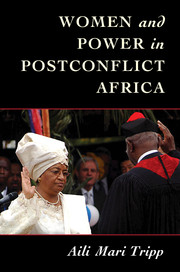Book contents
- Frontmatter
- Epigraph
- Dedication
- Contents
- List of Tables
- List of Figures
- Map of Africa
- List of Acronyms
- Acknowledgments
- Preface
- Part I Setting the Stage
- Part II Case Studies
- Part III New Openings for Women's Rights
- 6 Women's Rights in Peace Agreements
- 7 Women's Rights in Postconflict Constitutions
- Part IV Gendered Outcomes
- Part V Future Research
- References
- Index
6 - Women's Rights in Peace Agreements
from Part III - New Openings for Women's Rights
Published online by Cambridge University Press: 05 November 2015
- Frontmatter
- Epigraph
- Dedication
- Contents
- List of Tables
- List of Figures
- Map of Africa
- List of Acronyms
- Acknowledgments
- Preface
- Part I Setting the Stage
- Part II Case Studies
- Part III New Openings for Women's Rights
- 6 Women's Rights in Peace Agreements
- 7 Women's Rights in Postconflict Constitutions
- Part IV Gendered Outcomes
- Part V Future Research
- References
- Index
Summary
There are opportunities even in the most difficult moments.
– Wangari Maathai, UnbowedLike war, peacemaking is gendered and gendering. Like violence, peacemaking itself creates and reifies existing gendered power relationships. At the negotiating table, male warlords and leaders have divided up the spoils of war in new arrangements, that is, who gets which positions of power and the trappings of power that go along with them. Men negotiate at formal peace talks and come up with formal peace agreements, while women tend to be relegated to the informal, invisible, and localized peacemaking strategies. If this sounds too crude and simplistic, this is mostly how it has been in the conflicts discussed in this book, and there is little evidence to suggest otherwise.
However, women activists in many conflict countries in Africa in recent years have attempted to disrupt the gendered nature of this process by demanding seats at the peace table and by insisting that their demands be incorporated into the peace agreements. Their visions of what a peace agreement should look like have differed radically from what has been the norm. They realized they had to demand power if they were going to have any influence. Many were forced to think strategically.
The reality is that women have been largely excluded from peace negotiations, even after the passage of UNSCR 1325 in 2000 that was intended to remedy this by calling “on all actors involved, when negotiating and implementing peace agreements, to adopt a gender perspective.” Nevertheless, peace agreements have begun to incorporate women's rights language as a result of domestic and international pressures. This is evident in Africa to a greater extent than other parts of the world, as references to women between 2000 and 2012 tripled in all peace agreements (12% to 34%) and more than doubled in all comprehensive peace agreements (33% to 78%) from the previous decade (see Table 6.1). This helped set the stage for the later incorporation of women's rights into constitutions and into legislation as well as for women's presence in key governmental, legislative, and transitional institutions (see Chapters 7, 8, and 9; DPA 2004).
- Type
- Chapter
- Information
- Women and Power in Postconflict Africa , pp. 145 - 170Publisher: Cambridge University PressPrint publication year: 2015

